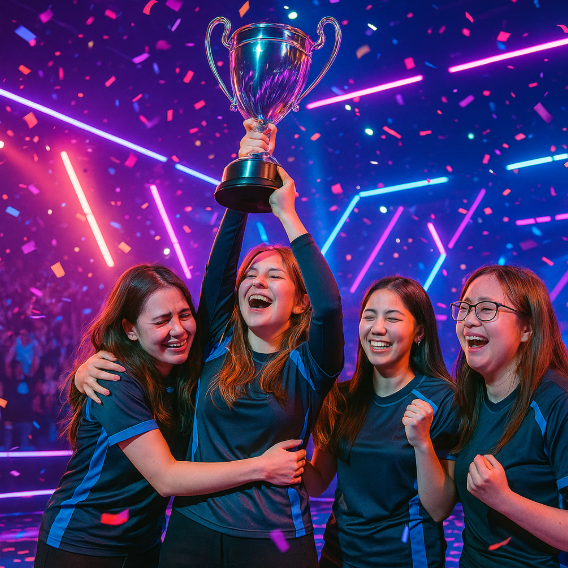Table of Contents
I still remember the first time I walked into an esports arena. The noise, the flashing lights, the sheer energy of it all it felt like stepping into the future. But even back then, something always nagged at me. I’d look around and realize that, for all the diversity gaming represented online, the stage in front of me told a different story. Almost every player was a guy.
Fast forward to 2025, and something beautiful is happening something overdue, powerful, and emotional. Women are no longer the outliers in esports. They’re the headline. They’re on stage, in jerseys, under those same bright lights, not as tokens or exceptions, but as equals competitors rewriting what “gamer” even means.
The landscape has shifted, and watching it unfold feels personal. It’s not just about tournaments or sponsors or stats. It’s about watching women who’ve fought for visibility finally take up the space they’ve always deserved.
From the Sidelines to Center Stage
When I think back to how far we’ve come, it’s almost surreal. Five or six years ago, women in esports were mostly part of side events, exhibition matches, or casual creator tournaments. They were talented, sure, but rarely given the same infrastructure or spotlight as the guys.
The narrative was frustratingly predictable: “Girls can’t keep up,” or “It’s a male-dominated space.” It was never really about ability it was about access. The pipelines that nurtured male talent were rarely open to women.
But 2025 feels different. This year, for the first time, multiple major esports organizations have women-led rosters competing at top-tier events not just in Valorant, CS2, or Overwatch, but even in historically male-heavy titles like Dota 2 and Apex Legends.
And honestly? Watching it feels emotional.
You can feel the energy in the room when an all-female lineup walks out to the same roaring crowd that once doubted their right to be there. It’s not just representation. It’s reclamation.
Rising Stars Who Redefined the Game
Every era has its icons, and 2025 belongs to a new generation of women who have become faces of change.
One of them is Lina “Nova” Kim, the 21-year-old South Korean CS2 player who’s redefining clutch under pressure. I remember watching her during the Copenhagen Invitational her team down 12–14, match point on the line. The crowd was restless, the casters breathless. And then Nova did it one headshot, two, three a clean 1v4 clutch that silenced the arena.
After the match, she didn’t cry, she didn’t boast. She just smiled quietly, looked at her teammates, and said, “That’s what we came here for.” It wasn’t just a win. It was a statement.
Then there’s Amira “Rei” Hassan from the Middle East a Valorant player who’s been breaking barriers since her debut in 2023. In regions where women’s visibility in esports was once almost nonexistent, Rei became a symbol of what’s possible. Her team, Crescent Dawn, not only qualified for the international Valorant Women’s Circuit this year but finished third the highest ever for a team from her region.
And in the world of fighting games, Sofia “CrushQueen” Velasquez has turned heads by dominating Tekken and Street Fighter tournaments, often sweeping male-dominated brackets. Her confidence, her unapologetic style, and her charisma have made her one of esports’ most beloved personalities.
What connects all these women isn’t just skill it’s resilience. They didn’t wait for permission to exist here. They forced the doors open.
All-Female Tournaments: A Movement, Not a Side Show
There was a time when “women’s tournaments” were dismissed as PR stunts smaller prize pools, less coverage, less legitimacy. But in 2025, all-female tournaments have evolved into something far bigger.
These events are no longer consolation prizes. They’re launchpads.
Take the VCT: Game Changers Global Championship for example. The event sold out its first venue in under 48 hours this year something even the main circuit couldn’t always achieve. Watching that final, you could feel the weight of it not just for the players on stage, but for every woman who’s ever been told, “You don’t belong here.”
The gameplay wasn’t “good for women.” It was just good. Period.
The same goes for Riot’s all-female League of Legends circuit, Blizzard’s Overwatch Empower Cup, and the inaugural Women’s Dota Summit, which debuted this year with an unprecedented $1 million prize pool.
But it’s not just about the money or the spotlight. These tournaments are building something more important a foundation. They’re creating an environment where women can compete, grow, and thrive without being underestimated from the moment they log in.
More Than Just Players — They’re Leaders
The rise of women in esports isn’t limited to the stage. It’s spreading behind the scenes too.
When I attended the Esports Leadership Summit earlier this year, I noticed something I hadn’t before: women leading organizations, coaching teams, running production, hosting events. The old boys’ club that once ran this industry is finally starting to make room for new voices.
People like Sasha Tran, who became the first woman to manage an international CS2 roster under Fnatic. Or Nora Al-Hadi, the Saudi executive behind one of the largest all-female gaming academies in the world. Or Katie Doran, who co-founded Level Up Women, a non-profit that provides mentorship and funding to female streamers and competitors.
They’re not just changing esports. They’re changing the culture around it.
And the difference is visible. The conversations are less toxic. The online spaces feel safer. The next generation of girls growing up watching these women will never have to wonder if they belong here they’ll know they do.
What It Feels Like to Watch History Happen
Sometimes, I’ll sit on my couch late at night, streaming a tournament on my laptop, and just smile. Because I remember when this didn’t exist.
I remember when you could scroll through Twitch and barely find a woman competing at a high level. I remember the online harassment, the disbelief, the way people would write “go make a sandwich” in chat whenever a woman picked up a controller.
And now I’m watching all-female finals being cast to millions. I’m watching young girls in the crowd holding up signs that say “She Inspires Me.” I’m watching dads tear up as their daughters walk onto stages once reserved for men.
It’s more than progress. It’s poetry.
I once heard a player say, “We’re not here to replace anyone. We’re here to prove there was room for us all along.” That stuck with me. Because that’s exactly what this movement feels like not an invasion, but an arrival.
The Challenges That Still Remain
Of course, we’re not done yet. There are still cracks in the system, still biases that run deep.
Sponsorships are improving, but they’re not equal. Some orgs still treat women’s teams as branding tools instead of athletes. And online harassment? It hasn’t vanished. It’s quieter, maybe, but it’s still there lurking in the comments, in the DMs, in the whispers.
But what’s different now is how women respond. They’re not apologizing or backing down anymore. They’re calling it out, owning their success, and supporting each other in ways the scene has never seen before.
And when I talk to female players, they don’t sound discouraged. They sound determined. They’ve seen what’s possible now and there’s no going back.
A New Kind of Legacy
I think about what all this means for the future.
Ten years from now, maybe we won’t need “women’s tournaments” because equality will be normal. But right now, these spaces are sacred. They’re where talent gets discovered, confidence gets built, and the culture shifts one win at a time.
I imagine a world where little girls grow up watching esports the way others watch the Olympics where they can name their favorite players, join mixed-gender teams without a second thought, and see themselves represented everywhere.
That world doesn’t feel far away anymore.
The Moment That Changed Everything
There was this moment during last year’s Valorant Game Changers final that I’ll never forget. The camera panned to the crowd, and in the front row was a little girl maybe 10, maybe younger holding a handmade sign that said, “One day that’ll be me.”
The player she was cheering for, a woman named Lexa, noticed her mid-match. After the game which they won Lexa ran to the edge of the stage, handed her jersey to that girl, and said, “It will be.”
That image went viral, of course. But beyond the likes and retweets, it was a moment that said everything words couldn’t.
Because that’s what all of this is about.
Not just breaking records. Breaking cycles.
2025: The Year Women Took Over Esports
This year will go down as a turning point. Not because women entered esports they’ve always been here but because the world finally noticed.
Every headline, every highlight reel, every trophy lifted by a female player chips away at the idea that esports belongs to one gender. Every time a young girl sees someone like her on stage, the future shifts a little more.
And for those of us who’ve been watching this story unfold for years the fans, the allies, the dreamers it’s impossible not to feel proud.
Because this isn’t just about gaming anymore. It’s about visibility. It’s about equality. It’s about rewriting what greatness looks like.
The women of esports aren’t coming. They’ve already arrived.
And they’re not here to ask for space. They’re here to own it.



